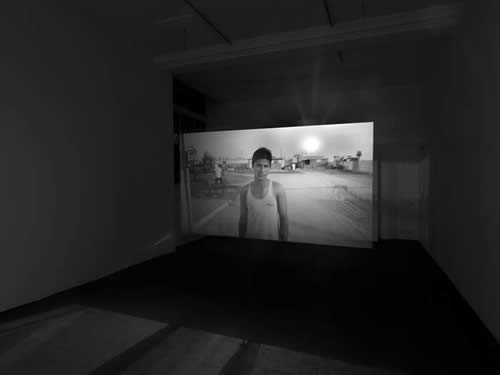Apichatpong Weerasethakul
11 Apr - 17 May 2014

© Apichatpong Weerasethakul
Dilbar, 2013
single channel video installation, in collaboration with Chai Siri
Dilbar, 2013
single channel video installation, in collaboration with Chai Siri
APICHATPONG WEERASETHAKUL
DOUBLE VISIONS
11 April – 17 May 2014
Artist and cult film director Apichatpong Weerasethakul is one of the central figures in contemporary cinema. Born in 1970 in Bangkok, he has been making films and working in video, photography and installation since 1994. Weerasethakul has participated in numerous film festivals, notably Cannes (2004, 2002) and Venice (2006). He won the Palme d'Or in 2010 with Uncle Boonmee Who Can Recall His Past Lives. An acclaimed artist, Weerasethakul has exhibited his work in museums worldwide and is represented in major public collections including Tate, London, San Francisco Museum of Modern Art and the Musée d'Art Moderne, Paris. Double Visions is the artist's first exhibition at Anthony Reynolds Gallery.
Included in the exhibition is the first UK presentation of Dilbar (beloved) commissioned for the 2013 Sharjah Biennial. This mesmerising installation reflects upon the life of just one of the million ‘invisible’ Bangladeshi workers labouring in the United Arab Emirates. Speaking about the works in the exhibition, Weerasethakul says:
“DOUBLE VISIONS is a survey of lights and focuses on illusion, dream and intimacy. It represents moments I would like to remember.
The works here range from my first video work, from 1999, to the most recent. I realise they share a certain obsession with lights, with escape. To me, the camera is always fearless. It can face intense luminosity which our eyes cannot tolerate. What it captures, however, is not truth. The act of filming is the act of staging, of remembering the seemingly real waking up every morning to the same person, the everlasting youth of teenagers by the river, the twilight appearance of Ray Bradbuy’s Mr. Electrico...”
“With civil unrest erupting repeatedly in Thailand in the course of the past decades, I have noticed that I started to sleep more. I have started to jot down my dreams. I have produced many movies, in dreams. In reality, people are being gunned down in the streets. Books are banned. Like the sleepers, I shun the malady of reality, and together we take refuge in dreams of forever.”
DOUBLE VISIONS
11 April – 17 May 2014
Artist and cult film director Apichatpong Weerasethakul is one of the central figures in contemporary cinema. Born in 1970 in Bangkok, he has been making films and working in video, photography and installation since 1994. Weerasethakul has participated in numerous film festivals, notably Cannes (2004, 2002) and Venice (2006). He won the Palme d'Or in 2010 with Uncle Boonmee Who Can Recall His Past Lives. An acclaimed artist, Weerasethakul has exhibited his work in museums worldwide and is represented in major public collections including Tate, London, San Francisco Museum of Modern Art and the Musée d'Art Moderne, Paris. Double Visions is the artist's first exhibition at Anthony Reynolds Gallery.
Included in the exhibition is the first UK presentation of Dilbar (beloved) commissioned for the 2013 Sharjah Biennial. This mesmerising installation reflects upon the life of just one of the million ‘invisible’ Bangladeshi workers labouring in the United Arab Emirates. Speaking about the works in the exhibition, Weerasethakul says:
“DOUBLE VISIONS is a survey of lights and focuses on illusion, dream and intimacy. It represents moments I would like to remember.
The works here range from my first video work, from 1999, to the most recent. I realise they share a certain obsession with lights, with escape. To me, the camera is always fearless. It can face intense luminosity which our eyes cannot tolerate. What it captures, however, is not truth. The act of filming is the act of staging, of remembering the seemingly real waking up every morning to the same person, the everlasting youth of teenagers by the river, the twilight appearance of Ray Bradbuy’s Mr. Electrico...”
“With civil unrest erupting repeatedly in Thailand in the course of the past decades, I have noticed that I started to sleep more. I have started to jot down my dreams. I have produced many movies, in dreams. In reality, people are being gunned down in the streets. Books are banned. Like the sleepers, I shun the malady of reality, and together we take refuge in dreams of forever.”
